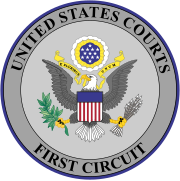Massachusetts v. United States Department of Health and Human Services
| Commonwealth of Massachusetts v. United States Department of Health and Human Services | |
|---|---|
 |
|
| Court | United States Court of Appeals for the First Circuit |
| Full case name | Commonwealth of Massachusetts v.United States Department of Health and Human Services, et al. |
| Citation(s) | 682 F.3d 1 |
| Case history | |
| Prior action(s) | 698 F.Supp.2d 234 (D.Mass. 2010) |
| Subsequent action(s) | Affirmed, Massachusetts v. U.S. Dept. Of Health, 682 F.3d 1 (1st Cir.); Petition for certiorari filed with the U.S. Supreme Court (No. 12-13) and denied. |
| Related action(s) |
|
| Holding | |
| Section 3 of DOMA fails a less-deferential rational basis review on Equal Protection Clause claims; the Spending Clause and Tenth Amendment do not proscribe DOMA, but they do influence the analysis of DOMA's justifications under equal protection review. | |
| Court membership | |
| Judge(s) sitting | Sandra Lynch, Chief Judge, Juan R. Torruella and Michael Boudin, Circuit Judges |
| Case opinions | |
| Majority | Boudin, joined by Torruella and Lynch |
| Laws applied | |
|
U.S. Const. amend. V, XIV Defense of Marriage Act |
|
Commonwealth of Massachusetts v. United States Department of Health and Human Services 682 F.3d 1 is a United States Court of Appeals for the First Circuit decision that affirmed the judgment of the District Court for the District of Massachusetts in a lawsuit challenging the constitutionality of section 3 of the Defense of Marriage Act (DOMA), the section that defines the terms "marriage" as "a legal union between one man and one woman as husband and wife" and "spouse" as "a person of the opposite sex who is a husband or a wife." Both courts found DOMA to be unconstitutional, though for different reasons. The trial court held that DOMA violates the Tenth Amendment and Spending Clause. In a companion case, Gill v. Office of Personnel Management, the same judge held that DOMA violates the Equal Protection Clause. On May 31, 2012, the First Circuit held the act violates the Equal Protection Clause, while federalism concerns affect the equal protection analysis, DOMA does not violate the Spending Clause or Tenth Amendment.
The First Circuit, anticipating that the parties would seek a review of the decision, stayed its decision. Both the Department of Justice and Commonwealth of Massachusetts asked the U.S. Supreme Court to review the decision by filing petitions for a writ of certiorari. The Supreme Court decided a similar case, United States v. Windsor, on June 26, 2013, and dismissed the petitions the following day.
On July 8, 2009, Massachusetts Attorney General Martha Coakley filed suit challenging the constitutionality of section 3 of DOMA in the United States District Court for the District of Massachusetts. It claimed that Congress "overstepped its authority, undermined states' efforts to recognize marriages between same-sex couples, and codified an animus towards gay and lesbian people."
...
Wikipedia
